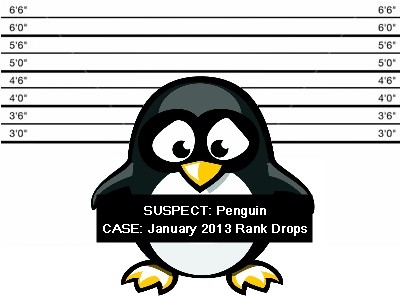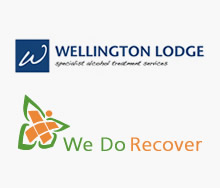Google Updates Panda: Penguin Becomes Prime Suspect In Rankings Drop Case
On the 22nd January 2013 Google rolled out its most recent Panda algorithm update, with a projected impact on just over 1% of UK websites. The aim is the same as Panda’s always has been – reducing spammy, poorly designed assets and putting the focus firmly back on good, solid websites with content that is of real value to real people.
Since then there’s been a lot of public outcry across the SEO industry as many websites saw their number of recognised backlinks and average search engine rankings take a sharp drop on the 17th of January this year. Changes to the more controversial Penguin algorithm update are suspected to have gone live, although Google is keeping firmly schtum on this front.

Penguin is generally believed to be a marvellous thing by white hat SEOs and the work of insanity by their black hat equivalents. Its aim was to diminish over-optimisation and excessive of anchor text on rubbishy article sites in order to place more of a focus on quality content that is useful to real users. The latest update suggests that much of the same has happened again, but with an even greater emphasis on the context of backlinks and how they are perceived by users (as well as search engine bots).
Across the board the generic article sites and “technical” backlink sources such as Alexa and generic directories (even human edited ones) like Yell.com have been scrapped from the lists of recognised links in Google Webmaster Tools, sending SEOs who engage in purely link-building exercises with little or no attention to content scrambling in a panic.
Fortunately those who have been focusing on content and context for articles and other backlink generations (and it should be pointed out here that we happily count ourselves amongst this number) have seen far less of an impact.
Context is now ruling alongside content as king of SEO – empty anchor text or URL links on unrelated pages surrounded by unrelated content or copy are rapidly dying out as they are discounted. It is surely only a matter of time before websites who rely solely on technical backlinks will start getting those links penalised rather than just ignored – time to get content writing now!
Fortunately our holistic approach to content marketing rather than “pure” SEO has left our clients sitting happily with consistent year on year visitor improvements and wondering why their competitors are howling at the moon at their dropping rankings and plummeting traffic levels. That’s the way we like it, and that’s why we’ve always placed a firm focus on SEO content which is built for users, not just for search robots.
So, how do those who are reeling from the update need to adjust their approach in order to get up to par with those of us already sipping tea in the shade and wondering at all the fuss?
- Stop focusing on ranking reports and “search engine position” – if you must report on this, wean your clients off the traditional rankings and onto the average rankings from Webmaster Tools instead (our clients may notice this in their reports this month if they haven’t in previous months)
- Get rid of your anchor text link spamming in footers and affiliates who plug things onto sites unrelated to your industry or sector – if you sell shoes, you need good, contextual links from sites related to footwear, not arbitrary anchor text farming from any unrelated website you can get your hands on
- Ditch the automated article sites and start courting authority websites and bloggers who can feature your content in a way that will make it relevant and useful to real users, not automated search bots
- Stop overusing anchor text and start putting links in a sensible way that people can read and use – cramming in links on keywords is 2013’s newest spam crime, so it’s far better to cite people and sources with links where users would expect to see them and click on them usefully, not just crammed in on every incidence of a keyword you can find on a page
If you’re perplexed by Panda, petrified by Penguin, generally gazumped by Google or bewildered by Bing, pick up the phone and call 0330 555 4680 today to find out how Cornish WebServices can help you build a sensible and sustainable set of online marketing to include SEO, PPC, social media and more.
PS we build beautiful websites too!
Published on 24/01/2013

























